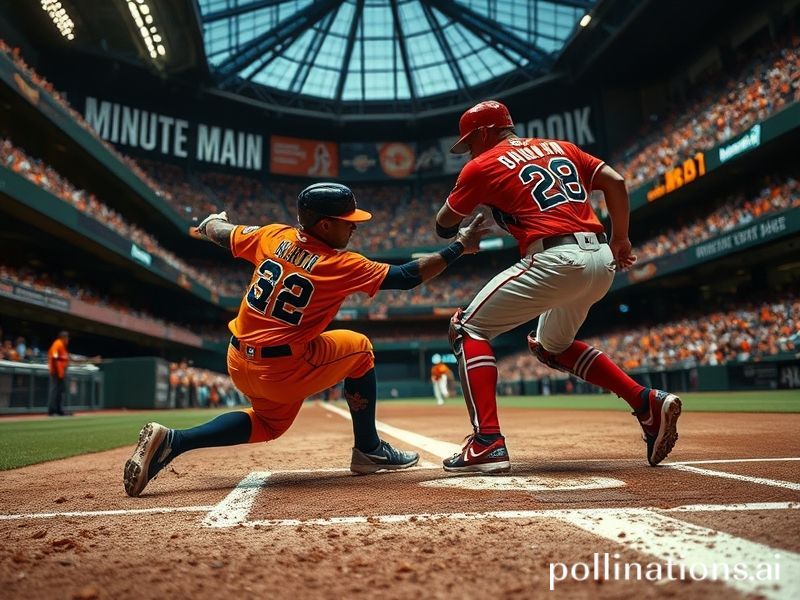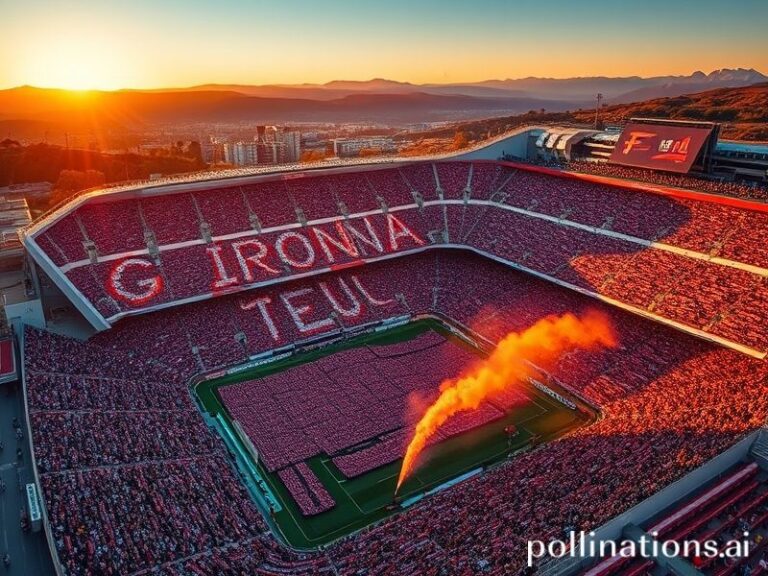Astros vs. Braves: How a Baseball Grudge Match Became the World’s Guilty Pleasure
Astros vs. Braves: A Cosmic Farce Played Out in Left Field
By Diego Valdés, International Sports Desk
Somewhere between the asteroid belt and the Beltway, the Houston Astros and the Atlanta Braves have managed to turn a provincial baseball quarrel into a planetary Rorschach test—one that reveals less about curveballs than it does about humanity’s unshakable urge to pick tribes, wave foam tomahawks, and monetize every last dopamine spike.
Let us begin with the obvious: the Astros are still doing penance for 2017’s sign-stealing debacle, the sporting equivalent of getting caught with crib notes at a nuclear disarmament summit. Internationally, this scandal plays differently. In Berlin, fans shrug—after all, the Bundesliga has survived match-fixing, wire taps, and a chairman who tried to buy a referee a speedboat. In Tokyo, where baseball is both religion and corporate KPI, the Astros’ wrist-slap sanctions look charmingly lenient, like apologizing for insider trading with a gift card to Arby’s. Meanwhile in Lagos, where electricity itself is a daily cliff-hanger, the notion of elite athletes cheating via trash-can Morse code is less outrage than luxury—a scandal you can only afford in countries with 24-hour Wi-Fi.
Across the dugout, the Braves brandish their own baggage: the Tomahawk Chop, a chant that makes Switzerland’s human-rights lawyers break out in hives. MLB’s global marketing wizards—those polyglot strategists who sell Yankees caps to yak herders in Mongolia—have spent years trying to rebrand the Chop as “cultural synergy.” The result is a perfect distillation of late-stage capitalism: a tone-deaf ritual repackaged as inclusive heritage, like putting a carbon-offset sticker on a coal furnace.
But the real spectacle is the meta-narrative. This World Series rematch arrives just as COP28 delegates argue over who gets the last lifeboat on the melting Titanic. While glaciers calve like overworked relief pitchers, Houston and Atlanta swap 450-foot moonshots in climate-controlled cathedrals where the beer is colder than Siberia and the air-conditioning bill rivals the GDP of Tonga. One imagines a future archaeologist—perhaps a cockroach with a PhD—excavating these ballparks and concluding that the dominant species spent its final decades perfecting the art of wasting energy in pursuit of a leather spheroid.
Still, the game travels well. In Seoul, fried-chicken joints stay open past dawn so salarymen can watch Jose Altuve turn on a 99-mph fastball before filing TPS reports. In São Paulo, bars stream the Braves’ bullpen like telenovelas, complete with gasps, prayers, and the inevitable heartbreak of a walk-off homer. Baseball, that most pastoral of American exports, has become the lingua franca of insomnia everywhere east of the Mississippi and west of the Mekong.
And then there is the money. The Astros’ payroll is roughly the annual budget of the World Food Programme’s Yemen operation; the Braves’ revenue would bankroll UNICEF’s global polio eradication effort—with enough left over for a decent middle reliever. Every time a luxury-tax threshold is breached, a Swiss banker somewhere updates a spreadsheet titled “Soft Power Index: Sports Edition.” The numbers are obscene, but so is the human habit of wagering emotional capital on millionaires whose batting averages fluctuate like cryptocurrency.
Yet, cynicism only buys you so many column inches. Underneath the branding fiascos and geopolitical guilt, there remains a stubborn beauty: a 23-year-old rookie from Caracas hugging his mother on FaceTime; a Japanese closer entering to an anime theme song; Dominican kids in San Pedro de Macorís mimicking Ozzie Albies’ swing with broomsticks and duct-taped bottle caps. These are the moments when the Astros-Braves spectacle stops being a morality play and reverts to its original purpose: a dumb, glorious excuse for strangers to high-five in languages they don’t speak.
So yes, the planet is on fire, the oceans are acidifying, and half the world can’t reliably Google the score. But for roughly three hours tonight, satellites will relay a child’s game between two American cities to every continent save Antarctica—where even the penguins, if given Wi-Fi, would probably choose sides. The final out will spark fireworks over Houston or Atlanta, fireworks that look suspiciously like the ones we can’t afford to shoot at each other anymore. And somewhere in that technicolor afterglow, you’ll find the sickest joke of all: we still believe the world can be fixed nine innings at a time.







